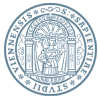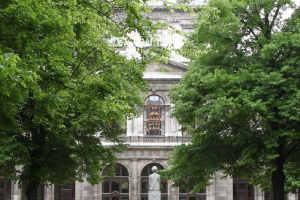Universitätsring 1, 1010 Wien, Austria
Career Counselling

The University of Vienna is the oldest institution of higher education in any German-speaking country. Located in the capital city of Austria, it is home to nearly 89,000 students, with more than 31% being international students.
Academic and research activities at the University of Vienna are divided into 15 Faculties (Catholic Theology, Protestant Theology, Law, Business, Economics and Statistics, Computer Science, Historical and Cultural Studies, Philological and Cultural Studies, Philosophy and Education, Psychology, Social Sciences, Mathema...
| Establishment year | 1365 |
| Total Students | 88,900 |
| International Students | 28,000 |
| QS World University Rankings 2024 | =130 |
| Campus Size | N/A |
| Total Number of Campuses | 60+ Locations in Vienna |
| University Website | https://www.univie.ac.at/en/ |
| No. of Schools and Divisions | 15 Faculties and 5 Centres |
| Nobel Prize Winner Alumni | 14 (Robert Barany, Richard Zsigmondy, Julius Wagner-Jauregg, Karl Landsteiner, Erwin Schrödinger, Victor Hess, Richard Kuhn, Max Perutz, Karl von Frisch, Konrad Lorenz, Friedrich Hayek, Elias Canetti, Elfriede Jelinek, Anton Zeilinger) |
| No. of Education Programs | 184 (undergraduate + postgraduate) |
| Student to Faculty ratio | 11.8:1 |
University of Vienna offers undergraduate and postgraduate courses through 15 Faculties and 5 Centres.
The 5 Centres deal with Translation Studies, Sports Science and University Sports, Molecular Biology, Microbiology and Environmental Systems Science, and Teacher Education.
All undergraduate and diploma programmes at the University of Vienna require proficiency in the German language (C1 Level, which denotes a high level of comprehension and communication ability). Many courses have specific requirements (e.g. prerequisite subjects); these can be found on the individual programme pages. International applicants will also need to submit proof of a completed high school secondary degree, along with grades or marks.
International applicants to Master programmes at the University of Vienna should first check if the medium of instruction for the course of interest is English or German; proficiency certificates (test scores) for the respective language must be submitted. All applicants to postgraduate courses must submit a provisional or final degree certificate from a recognised Bachelor’s degree programme. Course-specific requirements must also be met.
International applicants to undergraduate courses at the University of Vienna should check the admission procedure to the program of their course on the relevant University webpage. There are broadly three different kinds of paths: online application, online with compulsory self-assessment, and online with entrance examination. All online applications must be made through the University portal. After the applicant makes an account on this website, all the relevant documents, including personal documents, academic degrees and transcripts, and certificates of German proficiency, must be scanned and uploaded. Tens of thousands of applications are received every year, so a reply can often take several weeks. Once an offer is received, the applicant has to pay the Students’ Union Fee to confirm acceptance.
Around 20% of Bachelor’s degree programs at the University of Vienna require applicants to take the Online Self Assessment prescribed by the University; this takes 1-2 hours on average, and is applicable to courses like Astronomy, Physics, Slavonic Studies, and Theatre, Film and Media Studies.
Some undergraduate courses at the University (for example, Psychology) require applicants to pass a series of online examinations. These are conducted by the University Preparation Programme of the Vienna Universities, and usually entail multiple tests. For example, the Psychology admission process requires international applicants to pass examinations in German, Mathematics, English, and History / Geography.
The admission process for different Master programmes at the University of Vienna can be found on the relevant webpage. In addition to completing an online application, candidates applying to certain courses (e.g. Banking and Finance) may have to satisfy certain qualitative entry requirements e.g. work experience. About 30% of courses (e.g. Data Science) have additional selection procedures, like interviews or entrance tests.
All students at the University of Vienna must pay the Students’ Union fee. For domestic as well as international students, this amount is 22.70 Euros per semester, or 45.40 Euros per year.
Tuition fees for undergraduate students from outside the European Union are 726.70 Euros per semester, or 1,453.40 Euros per year. Students from around 50 developing countries do not have to pay tuition fees, with a similar temporary scheme for applicants from Ukraine. Students from European Union countries are exempt from paying tuition fees for the expected duration of their course plus two tolerance semesters; if their degree takes longer than this time period, they must pay half the fees that non-EU UG students pay per semester.
Tuition fees for postgraduate students can be found in the PG Brochure, which is updated on an annual basis. Each course has different annual fees, with the lowest tuition fees associated with certificate courses (around 3,000 Euros per year) and the highest tuition fees associated with Master degrees in psychology (up to 20,000 Euros per year).
The University of Vienna maintains an online estimate of the monthly cost of living in the city while attending classes. According to this, students can expect to pay between 1,200 and 1,230 Euros per month towards accommodation, food, transport, and personal expenses. Assuming that nine months are spent on campus annually, students at the University should budget approximately 11,000 Euros per year towards costs other than tuition fees.

The University of Vienna is spread over more than 60 locations in and around Vienna. Many of the buildings are centuries old, with the main building and the central library being notable architectural works.
Almost 70% of the campus of the University of Vienna is covered by a lake or forest; due to this reason, hiking is a very popular student pastime. The local sports hall on campus allows students to play popular indoor sports like table tennis, basketball, and volleyball. There are also outdoor grounds for football, tennis, and track and field enthusiasts.
Other popular athletic pursuits at the University are windsurfing and boating, with instructional courses available for beginners in these disciplines. The students' boathouse is a popular relaxation spot and a hub of social activities. Regular excursions and outings are organised; all sports facilities are free of charge for students of the University.

The University of Vienna provides its students with career help and training at every level. The online portal of the Career Centre (Uniport) allows students to view internships and job opportunities for which they are eligible depending on their level of education and department of study. There is also a section full of helpful career advice, including resume conventions, sample CVs, interview tips, and personality tests. There are also several stories from alumni; these help current students get a clear idea of their roles and responsibilities after graduation from the University. The Centre also organises regular events to help students prepare themselves for the job world, including career fairs (where students can meet prospective employers), seminars (which facilitate networking with senior company executives), job talks, e-recruiting events, and Master Thesis pitch events. Uniport also employs qualified career counsellors and coaches who help students with one-on-one advice.
The cost of living in Vienna is high, and many courses at the University are associated with high tuition fees. To offset these expenses, most overseas students need to apply for scholarships.
The University of Vienna maintains an online database of funding options for international and domestic students. Unlike at other top universities worldwide, Government scholarships typically do not fund the full degree for their awardees; they are usually applicable only for one semester or academic year. Most international students at the University rely on external financial aid sources in their country of origin - for example, Indian students enrolled in certain programmes can apply for the Tata Trusts Scholarships.
Research students (in both Master and Doctoral courses) at the University of Vienna can access several funding resources from local organisations. Most of these are awarded based on research skill and potential; published papers and a concrete research plan increase the probability of winning the most prestigious scholarships on this list. In addition to tuition fee waivers, many research fellowships award a monthly stipend that helps students deal with the cost of living.
